|
The WSIS
Forum 2016 represents the world's largest annual gathering of the ‘ICT for Development’ community. The WSIS Forum, co-organized by ITU, UNESCO, UNDP and
UNCTAD, in close collaboration with all WSIS Action Line
Facilitators/Co-Facilitators (UNDESA, FAO, UNEP, WHO, UN Women, WIPO, WFP, ILO,
WMO, UN, ITC, UPU, UNODC, and UN Regional Commissions) has proven to be an
efficient mechanism for coordination of multi-stakeholder implementation
activities, information exchange, creation of knowledge, sharing of best
practices and continues to provide assistance in developing multi-stakeholder
and public/private partnerships to advance development goals. This forum will
provide structured opportunities to network, learn and participate in
multi-stakeholder discussions and consultations on WSIS implementation.
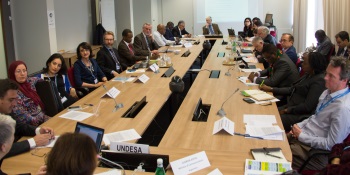 This event
builds upon the tradition of annual WSIS May meetings, and its format is the
result of open consultations with all WSIS Stakeholders. Emerging trends in 11
WSIS Action Lines both in terms of Policy and Technology are produced as an
Outcome of WSIS Forum in a multi-stakeholder environment on an annual basis.
The WSIS Forum 2016 Open Consultation Process on the Thematic Aspects and
Innovations on the Format aims at ensuring the participatory and inclusive
spirit of the WSIS Forum 2016 by actively engaging governments, civil society,
the private sector and intergovernmental organizations in the preparatory
process. The Agenda and Program of the WSIS Forum will be built on the basis
of the official submissions received during the Open Consultation Process. This event
builds upon the tradition of annual WSIS May meetings, and its format is the
result of open consultations with all WSIS Stakeholders. Emerging trends in 11
WSIS Action Lines both in terms of Policy and Technology are produced as an
Outcome of WSIS Forum in a multi-stakeholder environment on an annual basis.
The WSIS Forum 2016 Open Consultation Process on the Thematic Aspects and
Innovations on the Format aims at ensuring the participatory and inclusive
spirit of the WSIS Forum 2016 by actively engaging governments, civil society,
the private sector and intergovernmental organizations in the preparatory
process. The Agenda and Program of the WSIS Forum will be built on the basis
of the official submissions received during the Open Consultation Process.
IIS leaders
Yuri Hohlov and Tatiana Ershova participated in a number of Forum's events.
On May 5,
2016 they contributed to Action Lines C1 and C11 Facilitation Meeting «The Role
of Public Authorities and Global/Regional Cooperation in Ensuring that No One
is Left Behind in the Information Society» organized by United Nations
Department of Economic and Social Affairs (UNDESA) and International
Telecommunication Union (ITU).
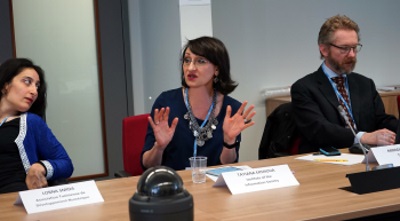 The 2030
Agenda for Sustainable Development pledges that no one will be left behind in
the implementation of the Sustainable Development Goals (SDGs). The role of
public governance authorities is crucial in the promotion of ICTs for achieving
better results, the provision of a robust enabling environment for ICTs to
flourish can accelerate the implementation of the SDGs. Capacity-building,
particularly for vulnerable groups, is equally important as is demand-driven
policy advice and technical assistance. Public authorities are also expected to
provide such support during the implementation of the SDGs. The 2030
Agenda for Sustainable Development pledges that no one will be left behind in
the implementation of the Sustainable Development Goals (SDGs). The role of
public governance authorities is crucial in the promotion of ICTs for achieving
better results, the provision of a robust enabling environment for ICTs to
flourish can accelerate the implementation of the SDGs. Capacity-building,
particularly for vulnerable groups, is equally important as is demand-driven
policy advice and technical assistance. Public authorities are also expected to
provide such support during the implementation of the SDGs.
International
cooperation among all stakeholders is vital in implementation of WSIS action
lines and the Sustainable Development Goals (SDGs). As stated by the General
Assembly in the WSIS+10 outcome document, the value and principles of
multi-stakeholder cooperation and engagement that have characterized the WSIS
processes since its inception have been and are vital in developing the
information society.
The meeting
provided a platform for participants to exchange information and experiences;
to identify priority areas for implementation within the Action Lines and to
explore synergies among different stakeholders for more effective knowledge
sharing and collaboration in the implementation process. The meeting was
moderated by Ms. Marion Barthelemy,
Acting Director, Division for Public Administration and Development Management
(DPADM), United Nations Department of Economic and Social Affairs (UNDESA).
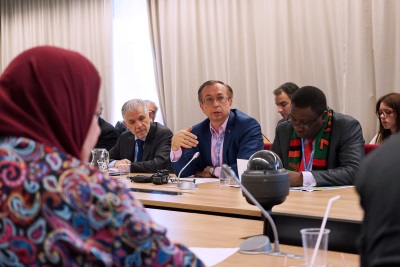 The list of panellists included: The list of panellists included:
-
Mr. Haidar Fraihat, Director of the
Technology for Development Division, United Nations Economic and Social
Commission for Western Asia
- Mr. Kasirim Nwuke, Chief, New Technologies
and Innovation Section, United Nations Economic and Social Commission for
Africa
- Ms. Clarisa Estol, Secretary for
Investment Promotion, Ministry of Communications, Argentina
- Ms. Lobna Smida, Association Tunisienne
de Développement Numérique, Tunisia
- Ms.
Marilyn Cade, Advisor, ICT
Associations from Developing Countries, United States of America
- Mr. Andy Richardson, Information
Specialist, Inter-Parliamentary Union
- Mr. Chengetai Masango, Programme and
Technology Manager, United Nations Internet Governance Forum
- Tatiana Ershova, General Director,
Institute of the Information Society, Russian Federation (see text of intervention here)
- Mr. Mikael Snaprud, Coordinator of the
European Internet Inclusion Initiative (EIII)
- Mr. Juan Raúl Heredía Acosta, Deputy
Permanent Representative at the Permanent Mission of Mexico
- Ms. Diana Parra Silva, Agency for
e-Government and Information Society, Office of the President of Uruguay
- Yuri Hohlov participated in the discussion around the C1
and C11 Action Lines.
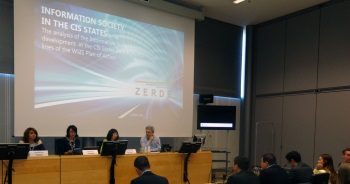 Tatiana Ershova also reported to the thematic workshop «Development of the Information Society in the CIS Countries» organized by JCS
National infocommunication holding «Zerde». Tatiana Ershova also reported to the thematic workshop «Development of the Information Society in the CIS Countries» organized by JCS
National infocommunication holding «Zerde».
The meeting
was moderated by Kuralay Yeleussizova, Vice Chairperson of the Management Board
of «Zerde» and opened by Rashid Ismailov, Vice Minister of Telecom and Mass
Communications of the Russian Federation.
Ms.
Yeleyssizova stressed that CIS Countries actively participate in the
development of the Information Society globally and regionally. Most of them
have contributed to the WSIS process initiated by the UN and held in two stages
between December 2003 and November 2005 in Geneva and Tunis. As 2015 was the
year of summarizing the results and further planning of the information society
development at the global, regional and national levels, the draft CIS
Cooperation Strategy in the field of Information Society Development up to 2025
and the Action Plan for its implementation consequently have been elaborated. In
this regard, an analysis of the situation in the CIS countries in the field of
Information Society development and appropriate policy recommendations along
specific actions for all stakeholders have become necessary.
Ms.
Yeleyssizova presented a comprehensove report on the results of analysis
performed along Action Lines C1-C7 for each CIS country. The main focus in the
analysis was made on the national programs and strategic documents in the field
of ICT. Relevant leading rankings offered by ITU and WEF also provided basis
for the analysis.
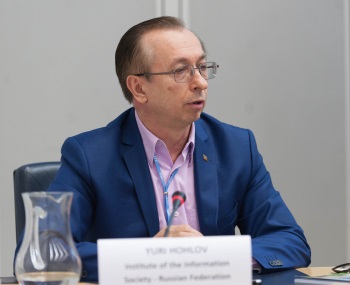 Tatiana
Ershova presented the international group of experts from CIS countries who had
contributed to the analysis: Hakob Hakobyan from Armenia; Qalib Qurbanov from
Azerbaijan; Alexander Martinkevich from Belarus; Laura Taganova, Talgat
Tulemisov, Evgeniy Lan and Aygul Zhusupova from Kazakhstan; Tattu Mambetalieva
and Artem Goryaynov from Kyrgyzstan; Ion Cosuleanu from Moldova; Yuri Hohlov,
Sergei Shaposhnik, Alexander Elizarov and Tatiana Ershova from Russia;
Asomiddin Atoev and Rustam Kosimov from Tajikistan; Evgeniy Kolotilov from
Ukraine. Tatiana
Ershova presented the international group of experts from CIS countries who had
contributed to the analysis: Hakob Hakobyan from Armenia; Qalib Qurbanov from
Azerbaijan; Alexander Martinkevich from Belarus; Laura Taganova, Talgat
Tulemisov, Evgeniy Lan and Aygul Zhusupova from Kazakhstan; Tattu Mambetalieva
and Artem Goryaynov from Kyrgyzstan; Ion Cosuleanu from Moldova; Yuri Hohlov,
Sergei Shaposhnik, Alexander Elizarov and Tatiana Ershova from Russia;
Asomiddin Atoev and Rustam Kosimov from Tajikistan; Evgeniy Kolotilov from
Ukraine.
In the afternoon Yuri Hohlov made a
presentation at the facilitation meeting for Action Line C7 e-Government organized by UNDESA
and ITU. The theme of the meeting was «How e-Government can ensure that no one
is left behind in the implementation of the Sustainable Development Goals». The
meeting was moderated by Ms. Marion Barthelemy, Acting Director, DPADM, UNDESA:
Session I – Overview
- Mr. Deniz Susar, Governance and Public
Administration Officer, DPADM, UNDESA
- Mr. Hani Eskandar, ICT Applications
Coordinator, International Telecommunications Union
-
Mr. Tomasz Janowski, Founding Head,
Operating Unit on Policy-Driven Electronic Governance, United Nations
University (UNU)
- Mr. Haidar Fraihat, Director of the
Technology for Development Division, United Nations Economic and Social
Commission for Western Asia (UN ESCWA)
- Mr. Yuri Hohlov, Chairman of the Board,
Institute of the Information Society, Russian Federation (see
presentation here)
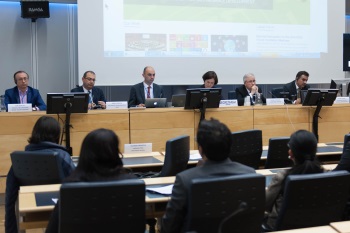 Session II – Case Studies Session II – Case Studies
- Mr. Walter Fust, Former Head, Swiss Agency
for Development Cooperation and Humanitarian Relief, Switzerland
- Ms. Roshni Sen, Department of Women
Development and Social Welfare, Government of West Bengal, India
- Mr. Vladimir Averbakh, Director General of
the Department of E-government Development, Ministry of Communications and Mass
Media, Russian Federation
- Mr. Salem Saqer, Head of the Department of
Systems & Programs Maintenance, Ministry of Interior, United Arab Emirates
|

